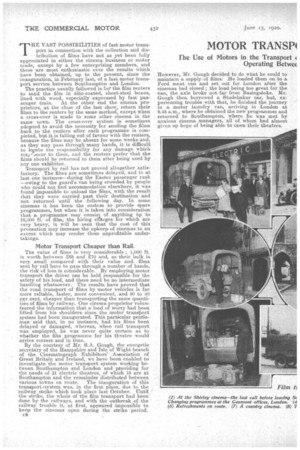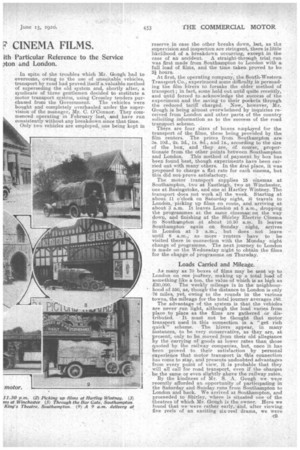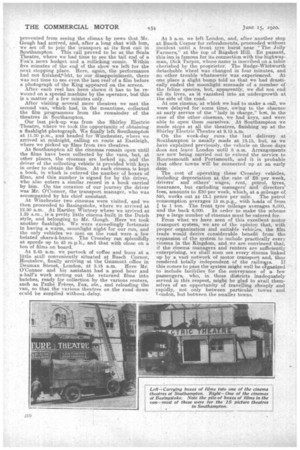MOTOR TRANSP1 CINEMA FILMS.
Page 8

Page 9

Page 10

If you've noticed an error in this article please click here to report it so we can fix it.
The Use of Motors in the Transport (
Operating Betwec ith Particular Reference to the Service *on and London.
THE VAST POSSIBILITIES of fast motor transport in connection with the collection and distribution . of films have not as yet been fully appreciated in either the cinema business or motor trade, except by a few enterprising members, and these are most enthusiastic over the results which have been obtained, up to the present, since the inauguration, in February last, of a fast motor transport service between Southampton and London. The practice usually followed is for the film renters to send the film in. zinc-coated, sheet-steel boxes, lined with wood, especially expressed by fast passenger train. At the other end the cinema proprietors, at the close of the last show, return their films to the renters by the same method, except when a cross-over is made to some other cinema in the same town. The cross-over system is sometimes adopted to avoid the necessity for sending the. films back to the renters after each programme is completed, but it is falling out of favour with the renters, because the films may be absent for some weeks and, as they may pass through many hands, it is difficult to. locate the, responsibility for any damage which mar-uccur to them, and the renters prefer that the films should be returned to them after being used by any one exhibitor. -Transport by rail has not proved altogether satisfactory. The films are sometimes delayed, and in, at last one instance—during the Easter passenger rush —owing to the guard's van being crowded by people who could nob find accommodation elsewhere, it was found impossible to unload the films, with the result that they were carried past their destination and not returned until the following day. In some cinemas it. has been the custom to provide spare . programmes, but when it is taken into consideration that a programme may consist of anything hp to 18,000 ft. of film; the hiring el-threes for which are very heavy, it will be seen that the cost of this precaution may increase the upkeep of cinemas to an extent which may render them unprofitable under
takings. .
Motor Transport Cheaper than Rail.
The value of films is very considerable ; 1,000 ft. is worth between 265 and £70 and as their bulk is very small compared with their value and. films sent by rail have to pass through a number of hands, the risk of loss is cOnsiderable. By employing motor transport the driver can be held responsible for the safety of his load, and there need be no intermediate handling whatsoever. The results have proved that the road transport of films by motor vehicles is far more reliable, faster, more convenient, and 30 to 40 per cent, cheaper than transporting the same quantities of films by railway. One cinema proprietor volunteered the information that a load of worry had been lifted from his shoulders since the motor transtort system had been inaugurated. This particular gentleman said that, in no instance, had his films been delayed or damaged, whereas, when rail transport was employed, he was never quite certain as to whether the film programme for his theatre would 'arrive correct and in time.
By the courtesy of Mr. S.A. Gough, the energetic secretary of the Hampshire and Isle of Wight branch of the Cinematograph Exhibitors' Association of Great Britain and Ireland, we have been enabled to investigate the motor transport system working between Southampton and London and providing for the needs of 21 electric theatres, of which 15 are at Southampton and the remainder distributed between various towns en route: The inauguration of this transport 'system was, in the first place, due to the railway strike which took place last October. Until • the strike, the whole of the film transport had been done by the railways, and with the outbreak of the railway trouble it, at first, appeared impossible to keep. the cinemas open during the strike period. c8
However, Mr. Gough decided to do what he could to maintain a supply' offilms. He loaded them on to a Ford meat van and set out for London after the cinemas had closed ; the load being too great for the van, the axle broke not far from Basingstoke. Mr. Gough then borrowed a Studebaker car, but, experiencing trouble with that, he finished the journey in a motor laundry van, arriving in London at 8.45 a.m., where he obtained the new programmes and returned to Southampton, where he was met by anxious cinema managers, all of whom had Almost given up hope of being able to open their theatres.
In spite of the troubles which Mr. Gough had to overcome, owing to the use of unsuitable vehicles, transport by road had proved itself a valuable method of superseding the old system and, shortly after, a • syndicate of three gentlemen decided to institute a • motor transport system, using Crossley tenders purchased from the Government. The vehicles were • bought and completely overhauled under the supervision-of the manager, Mr. C. O'Connor. They commenced operating in February last, and have run consistently without any breakdown since that time. Only two vehicles are employed, one being kept in
reserve in case the other breaks .down, but, as the supervision and inspection are stringent, there is little likelihood of a breakdown occurring, except in the case of an accident. A straight-through trial run was first made from Southampton to London with a full load of films, and the time taken proved to laa
2,+hours. • At first, the operating company, the South-Western Transport Co., experienced some difficulty in persuading the film hirers to forsake the older methed of transport; in. fact, some held out until quite recently, and until forced to-acknowledge the success of the experiment and the saving to their pockets through the reduced tariff charged. Now, however, Mr. Gongh is being almost overwhelmed by inquiries received from London and other parts_ of the country soliciting information as to the 'success of the road traiwort scheme. There are four sizes of boxes empL?yed for the transport of the films, these being provided by the film renters. The prices from Southampton are as. 10d, 2s. 3d., is. 8d, and is., according to the size of the box, and they are, of course, proportionate from the other points between Southampton and London. This method of payment by box has been found best, though experiments have been carried out with many others. In the iirst place, it was proposed to charge a fiat rate for each cinema, but this did not.., prove satisfactory.
The motor transport supplies 15 cinemas at Southampton, two at Eastleigh two at Winchester, one at Basingstoke, and one at ffartley Wintney. The transport does not work all the week. Starting at a-bout 11 o'clock on Saturday night, it travels to London, picking up films en route, and -arriving at about 3 a.m. It leaves London at 5 a.m., dropping the programmes at the same cinemas on the way down, and finishing at the Shirley Electric Cinema in Southampton at about 10.30 a.m. It leaves Southampton again on Sunday nig-ht, arrives m London at 3 a.m., but does not leave until 8 a.m., as more renters have to be visited there in connection with the Monday night change, of programme. The next journey to London is made on the Wednesday night to obtain the -films for the changeof programme on Thursday.
Loads Carried and Mileage.
As many as 70 boxes of films may be sent up to London on one joutney, making up a total load of something like a ton, the value of which is as high as £30,000. The weekly mileage is in the neighbourhood of 550, as, though the distance to London is only 76 miles, yet, owing to the rounds in the various towns, the mileage for the total journey averages 180. The advantage of the system is that the vehicles are never run light, although the load varies from place to place as the films are gathered Or distributed. It must not be thought that motor transport used in this connection is a "get rich fluiek" scheme. The hirers appear, in many instances, to be very conservative, as they are, at present, only to be moved from their, old allegiance by the carrying of goods at lower rates than those quoted by the railway companies, but, once it has been proved to their satisfaction by personal experience that motor transport. in this connection has come to stay, and presents undoubted advantages from every point of view, it is probable that they will all call for road transport, even if the charges be the same or even slightly above the railway rates.. By the kindness of Mr. S. A. Gough we were recently afforded an opportunity of participating in the Saturday and-Sundayruns from Southampton to London and back. We arrived at Southampton, and proceeded to Shirley, where is situated one of the theatres of which Mr. Gough is the owner. Here we found that we were rather early, and, after viewing five reels of an exciting six-reel drama, we were
prevented from seeing the climax by news that Mr. Gough had arrived, and, after a long chat with him, we set off to join the transport at its first call in Southampton. This call proved to be at the Scala Theatre, where we had time to see the tail end of a Fox's news budget and a rollicking comic. Within five minutes of the end of the show we left for the next stopping place. Here, again., the performance had not finished;.,blit, to our disappointment, there was not time to see even the last reel:of a film before a photograph of the King appeared on the screen.
After' each reel has been shown it has to be rewound on a, special machine by the operator, but this is a matter of a few minutes only.
After visiting several more theatres we met the second van, which had, in the meantime, collected the film programmes from the remainder of the i theatres n Southampton.
Our last pick-up was from the Shirley Electric Theatre, where we took the opportunity 01 abtaining a flashlight photograph. We finally left Southampton at 11.30 p.m., and headed for Winchester, where we arrived at midnight, calling en route at Eastleigh, where we picked up films from two theatres.
At Southampton all the cinemas remain open until the films have been collected by the vans, but, at other places, the cinemas are locked up, and the driver af the collecting vehicle is provided With keys in order to obtain the films. At each cinema is kept a hook, in which is entered the number of boxes of films, and this number is signed for by the 'driver, who also enters a similar record in a book carried by him. On the occasion of our journey the driver was Mr. O'Connor, the transport manager, who was accompanied by his chief assistant. At Winchester two cinemas were visited, and we then proceeded to Basingstoke, where we arrived at 12.50 a.m. At Hartley Wintney where we arrived at 1.25 is a pretty little cinema built in the Dutch style, and belonging to Mr. Gough. Here we took another flashlight. We were exceedingly fortunate in having a warm, moonlight night for our run, and the only vehicles we met on the road were a, few belated chars-a-banes. The Crossley ran splendidly at speeds up to 43 m.p.h:, and that with olose on a ton of films on board.
• At 2.45 a.m. we partook of coffee and buns at a little stall conveniently situated at Busch Corner, Hounslow, finally arriving at the Gaumont office in Denman Street, London, at 3.15 a.m. -Here Mr. O'Connor and his assistant had a goad hour and a-half's work sorting out the returned films into batches, ready for collection by the various renters, such as Pathe Freres, Fox, eta., and reloading the van, so th,at the various theatres on the road down ceuld be supplied without, delay. At 5 am. we left London, and, after another stop at Busch Corner for refreshments proceeded without incident until a front tyre burst near "The Jolly Farmers," at the top of Bagshot Hill. . En passant, this inn is famous for its connection with the highwayman, Dick Turpin, whose name is inscribed on a table cherished by the proprietor. The Rudge-Whitworth detachable wheel was changed in four minutes, and no other trouble whatsoever was experielaced. At one place a slight bump told us that we had drastically ended the moonlight serenade of a member of the feline species, but, apparently, we did not end all its lives, as it vanished into an undergrowth at the side of the road.
At one cinema, at which we had to make a call, we were delayed for some time, owing to the absence at early service of the "lady in charge," bat, in the case of the other ainemaa we had keys, and were able to open them ourselves. At Southampton we made stops at all the theatres, finishing up at the Shirley 'Electric Theatre at 9.15 a.m.
On the week-day runs the last delivery at Southampton is usually made at 12.15, but, as we have explained previously, the vehicle on those days does not leave London until 8 a.m. Arrangements are now being carried out to extend the service to Bournemouth and Portsmouth, and it is probable that other towns will be connected up at an early date.
The cost of operating these Crossley vehicles, including depreciation at the rate of 26 per week, drivers' and others' wages, rent, petrol, tyres, insurance, but excluding managers' and directors' fees, amounts to 230 per week, which, at a mileage of_ 550, works out at 13.1 pence per-nine. The petrol consumption averages 13 m.p.g., with loads of from
to 1 ton. The. front tyre mileage averages 8,000, and the back 6,000. In order to make the scheme pay a large Dumber of cinemas mast be catered for.
From what we have seen of this excellent motor transport system, we are of the opinion that, with proper organization and suitable vehicles, the film trade would derive considerable benefit from the expansion of the system to include practically every cinema in the Kingdom, and we are convinced that, if the cinema managers and renters are sufficiently enterprising, we shall soon see every cinema linked up by a 'vast network of motor transport and, thus rendered totally independent of the railwvs. If this comes to pass the system might well be organized to include facilibies for ihe conveyance of a, few passengers, who, in those districts inadequately served in this respect, might be glad to avail themselves of an opportunity of travelling cheaply and rapidly, not only between particular towns and London, but between the smaller towns.




























